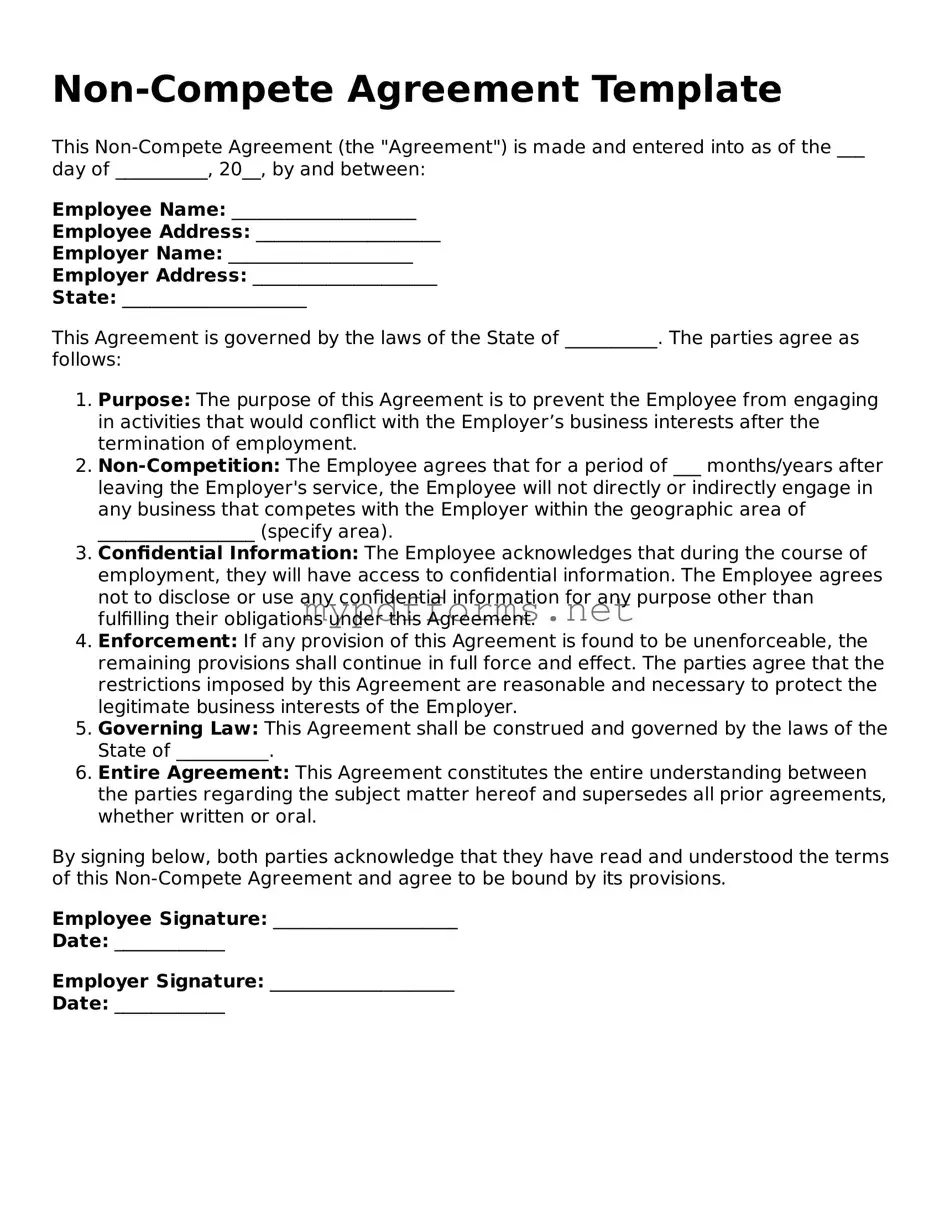A Non-disclosure Agreement (NDA) shares similarities with a Non-compete Agreement in that both aim to protect sensitive information. An NDA prevents individuals from sharing confidential data, trade secrets, or proprietary information with outside parties. In contrast, a Non-compete Agreement restricts individuals from working with competitors or starting similar businesses for a specified time after leaving a job. Both documents are designed to safeguard a company's interests and maintain its competitive edge.
A Non-solicitation Agreement is another document that aligns closely with a Non-compete Agreement. This type of agreement prohibits individuals from soliciting a company’s clients or employees after leaving the organization. While a Non-compete Agreement restricts the ability to work in the same industry, a Non-solicitation Agreement focuses on preventing direct engagement with a company's existing relationships. Together, they help protect a business's workforce and client base.
An Employment Agreement often includes clauses similar to those found in a Non-compete Agreement. This document outlines the terms of employment, including job responsibilities, salary, and duration of employment. Within an Employment Agreement, there may be specific provisions that restrict an employee's ability to compete with the employer after termination. This ensures that both parties understand their obligations and rights during and after the employment period.
A Confidentiality Agreement is akin to a Non-compete Agreement as both seek to protect a company's interests. While a Non-compete Agreement focuses on restricting future employment in similar fields, a Confidentiality Agreement ensures that sensitive information shared during employment remains confidential. Both documents serve to maintain the integrity and security of a business's operations and intellectual property.
A Franchise Agreement often contains provisions similar to those in a Non-compete Agreement. When someone buys a franchise, they agree not to open a competing business within a certain geographic area for a specified time. This helps protect the franchisor's brand and ensures that franchisees do not undermine each other's success. Both agreements focus on maintaining a healthy business environment and protecting brand integrity.
A Release of Claims document bears some resemblance to a Non-compete Agreement. This document is often signed when an employee leaves a company, releasing the employer from any future claims. Sometimes, it may include clauses that restrict the former employee from competing or soliciting clients. Both documents aim to clarify the expectations and limitations of the relationship after employment ends.
A Settlement Agreement can also be compared to a Non-compete Agreement. This document is typically used to resolve disputes between parties, often involving compensation or other terms. It may include clauses that prevent one party from competing with the other as part of the settlement. Both types of agreements are designed to protect the interests of the parties involved and provide clarity on future conduct.
The New Jersey ATV Bill of Sale form is a document used to record the transfer of ownership of an all-terrain vehicle (ATV) from seller to buyer in the state of New Jersey. It serves as a legal record of the transaction, ensuring that all the details regarding the sale are documented accurately. For more information, you can refer to NJ PDF Forms, which provide the necessary resources for obtaining this essential document for both parties for registration, tax, and legal purposes.
A Licensing Agreement can be similar to a Non-compete Agreement in that it governs the use of intellectual property. This document allows one party to use another's intellectual property under specific conditions, which may include restrictions on competing products. Both agreements help ensure that proprietary information and business interests are protected, fostering a fair business environment.
Finally, a Trade Secret Agreement is closely related to a Non-compete Agreement. This document is specifically designed to protect a company's trade secrets from being disclosed or used by others. While a Non-compete Agreement restricts future employment in competing businesses, a Trade Secret Agreement focuses on safeguarding sensitive information. Both documents are crucial for maintaining a company's competitive advantage and proprietary knowledge.

